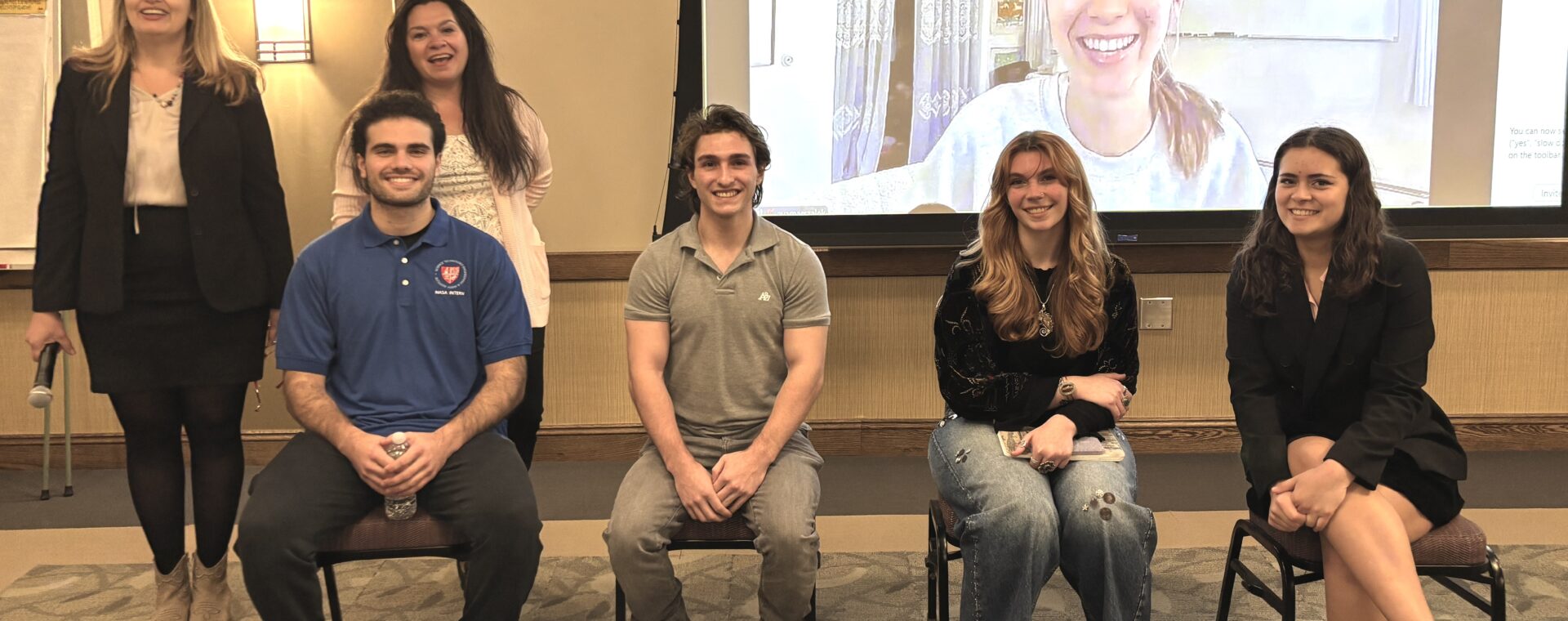Brookdale Community College’s 11th NASA Internship Cohort recently showcased their year-long research projects, offering a compelling look into the innovative work being conducted by students as part of the New Jersey Space Grant Consortium (NJSGC). From evaluating water filtration systems to exploring solar power on Mars, the presentations highlighted the depth and diversity of STEM inquiry happening right here at Brookdale.
The NASA Internship Program provides Brookdale STEM majors with the opportunity to conduct original research under the guidance of faculty and industry mentors. Each project culminates in a formal presentation, contributing to real-world scientific exploration and giving students a strong foundation for academic and professional success.
Here’s a closer look at this year’s research:
Evaluating Consumer Water Filter Performance
By Ava Marszalek | Mentor: Tom Riley | Adviser: Ana Teodorescu
Marszalek tested the effectiveness of popular household water filters—Brita and PUR—by measuring their ability to remove calcium and potassium ions from a concentrated solution. She also investigated whether the filters’ ion exchange resins could be regenerated using a sodium chloride solution. Her findings provide insight into the inner workings and longevity of these consumer products, helping users make more informed choices.
The Effects of the Solar Eclipse on Radio Waves
By Arthur Fumarola | Mentors: John Magliacane & Kevin Squires | Adviser: Nancy Cizin
Fumarola’s research focused on how solar eclipses affect the Earth’s ionosphere and, in turn, the propagation of radio waves. By studying signal behavior during eclipses—especially changes in the ionosphere’s D-layer—he contributed to a better understanding of how solar events can disrupt radio communication.
Mycoremediation of Petroleum Hydrocarbons
By Rhiannon Ryan | Mentors: Dr. Gitanjali Kundu & Tanner Orzut | Adviser: Nancy Cizin
Ryan explored the use of fungi—specifically oyster mushrooms—to remediate petroleum-contaminated environments. Her objective was to observe fungal growth in the presence of pollutants and analyze nutrient differences in the substrate. The study revealed the mushrooms’ resilience and their potential as a sustainable tool for ecological restoration through mycoremediation.
Surface Binding Ability of Photoinitiator Polymers
By Leana Vitale | Mentor: Tanner Orzut | Adviser: Nancy Cizin
Vitale studied various photoinitiators used in gel nail polishes—including benzophenone and hydroxycyclohexyl phenyl ketone—to understand their surface binding strength and curing times. Her research highlights how molecular differences influence performance, offering insights that could advance both cosmetic chemistry and broader polymer applications.
Martian Solar Panels
By Steven DelCuore | Mentor: Michelle Paci | Adviser: Ana Teodorescu
DelCuore investigated how to develop solar panels suitable for the harsh conditions on Mars. He examined factors like reduced sunlight, dust storms, extreme temperature swings, and high UV radiation. His objective was to model a solar panel design for Martian use and explore materials and design strategies to overcome the planet’s unique challenges.
Martian design considerations included:
- Thin atmosphere resulting in reduced atmospheric scattering
- Frequent dust storms and airborne particles
- Extreme temperature fluctuations
- Reduced solar irradiance
- Higher intensity of ultraviolet radiation
DelCuore’s proposed solutions featured:
- High-efficiency solar cells with UV protection
- Flexible, heat-resistant designs
- Low-temperature batteries supported by radioisotope heating for energy storage
These student-led projects not only reflect the academic rigor of Brookdale’s NASA interns but also support NJSGC’s mission to foster space science and STEM advancement across New Jersey.
About the NASA Internship at Brookdale
Administered through the New Jersey Space Grant Consortium, the NASA Internship Program is open to full-time Brookdale students who are U.S. citizens, majoring in a STEM field, have completed at least 24 credits, and maintain a minimum 3.0 GPA. Participants complete a year-long research project under the guidance of a faculty mentor and are expected to stay active in a STEM-related club or activity. Some interns may also have the opportunity to work with a NASA center over the summer.
Students interested in applying for the 2025–2026 cohort should contact Ana Teodorescu at ateodorescu@brookdalecc.edu and Nancy Cizin at ncizin@brookdalecc.edu.
To learn more about the New Jersey Space Grant Consortium, visit https://njsgc.rutgers.edu/
 Bookstore
Bookstore  Self Service
Self Service 
